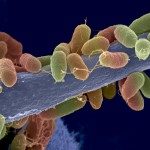Lien vers Pubmed [PMID] – 19439372
Trends Pharmacol. Sci. 2009 Jun;30(6):287-95
Despite being used for more than 80 years, the mechanisms of induction of immune responses by aluminum adjuvants, generically referred to as ‘alum’, remain largely unknown. However, substantial amounts of recently gathered data demonstrate that aluminum salts induce an innate immune reaction at the site of vaccination. Thus, aluminum salts activate dendritic cells, monocytes and macrophages with enhanced expression of adhesion molecules CD54 and CD58 and co-stimulatory molecules CD40 and CD86, which are crucial in T cell activation; induce chemokines CCL2, CCL3, CCL4 and CXCL8, which mediate recruitment of inflammatory cells at the site of vaccination; and stimulate cytokines crucial in the innate immune response. Aluminum adjuvants activate the nucleotide-binding domain and leucine-rich-repeat-containing gene family pyrin-domain-containing 3 (known as NLRP3 or NALP3) inflammasome to activate caspase-1 and to induce proinflammatory cytokines interleukin (IL)-1beta and IL-18 by innate cells. Aluminum adjuvants activate NLRP3 by multiple mechanisms such as by causing damage and rupture of the phagolysosomes, generating reactive oxygen species, inducing K(+) efflux and via release from injured tissues of molecules that constitute danger-associated molecular patterns (DAMPs) such as uric acid and ATP. These novel cellular and molecular mechanisms of aluminum salts are likely to influence how we design effective and safe adjuvants in the future.

